
What is Evidence-Based Therapy?
Evidence-Based Therapy (EBT), also known as Evidence-Based Psychotherapy, refers to treatment approaches demonstrated to be effective through rigorous scientific research. It is an alternative to standard Talk Therapy, which often is unstructured and ineffective, and may foster a patient’s dependence on a therapist. EBTs have been developed to target specific mental health conditions unlike the one-size-fits-all approach that often characterizes Talk Therapy. EBTs are the first line “gold standards” of mental health therapy. Therapists delivering EBTs teach their patients skills and utilize treatment techniques with proven effectiveness for reducing mental health symptoms like depression and anxiety. At MCEBT, we use EBTs that are tailored to each patient's unique needs, preferences, and identities (e.g., racial/cultural background, gender identity, sexual orientation, faith, etc). Click here to learn more.
5 Key Characteristics of EBT
-
Rigorous peer-reviewed research is necessary for mental health treatments to become established as EBTs. EBTs must be consistently demonstrated to produce positive outcomes for patients with specific mental health conditions.
-
EBTs are not a one-size-fits-all approach. Therapists consider each client's individual characteristics, preferences, cultural background and life circumstances when choosing and implementing the most appropriate treatment.
-
EBTs encourage active collaboration between therapists and patients to help determine the focus and pace of treatment in the pursuit of the patients’ goals.
-
EBTs are designed to address specific mental health conditions and/or symptoms, with research-backed techniques and strategies that have been shown to be effective for those conditions.
-
EBTs prioritize accountability, ensuring that treatments are chosen and implemented based on evidence of effectiveness, and that outcomes are measurable and regularly monitored.

